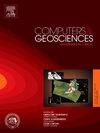Large-scale 3-D magnetotelluric modeling in anisotropic media using extrapolation multigrid method on staggered grids
IF 4.4
2区 地球科学
Q1 COMPUTER SCIENCE, INTERDISCIPLINARY APPLICATIONS
引用次数: 0
Abstract
To improve the practicality and efficiency of 3D magnetotelluric (MT) data inversion, developing a 3D MT forward modeling algorithm with low computational cost in terms of time and memory is an important prerequisite. An extrapolation cascadic multigrid (EXCMG) method is developed on rectilinear grids to accelerate the solving process of large linear systems arising from the staggered-grid finite difference (SFD) discretization of Maxwell’s equations. Arbitrary anisotropic conductivity is considered, without adding extra unknowns to the SFD scheme. A new prolongation operator based on global extrapolation and mixed-order interpolation is developed to tackle the issue caused by non-nested unknown distribution. The divergence correction scheme for arbitrary anisotropy is employed to stabilize the smoothing process, especially for low-frequency cases. Several examples are tested to validate the accuracy and efficiency of the proposed algorithm, including synthetic models with anisotropy and topography, and the real-world Cascadia model. Results show that our EXCMG solver is more efficient than traditional iterative solvers (e.g., the preconditioned BiCGStab), the algebraic multigrid method and the geometric multigrid (GMG) method. The proposed method can efficiently solve large-scale problems with large grid stretching factors and arbitrary anisotropy, providing powerful engine for large-scale MT inversion.
交错网格外推多网格法在各向异性介质中的大尺度三维大地电磁模拟
为了提高大地电磁数据三维反演的实用性和效率,开发一种计算成本低、存储时间短的大地电磁三维正演算法是一个重要的前提。为了加速麦克斯韦方程组交错网格有限差分(SFD)离散引起的大型线性方程组的求解过程,在直线网格上提出了一种外推叶栅多重网格(EXCMG)方法。考虑任意各向异性电导率,而不向SFD方案添加额外的未知数。针对非嵌套未知分布的问题,提出了一种基于全局外推和混合阶内插的扩展算子。采用任意各向异性的散度校正方案来稳定平滑过程,特别是在低频情况下。通过对具有各向异性和地形的合成模型以及实际的Cascadia模型进行了测试,验证了该算法的准确性和效率。结果表明,我们的EXCMG求解器比传统的迭代求解器(如预处理的BiCGStab)、代数多重网格法和几何多重网格法(GMG)更有效。该方法可以有效地解决具有大网格拉伸因子和任意各向异性的大规模问题,为大规模大地电磁法反演提供了强大的引擎。
本文章由计算机程序翻译,如有差异,请以英文原文为准。
求助全文
约1分钟内获得全文
求助全文
来源期刊

Computers & Geosciences
地学-地球科学综合
CiteScore
9.30
自引率
6.80%
发文量
164
审稿时长
3.4 months
期刊介绍:
Computers & Geosciences publishes high impact, original research at the interface between Computer Sciences and Geosciences. Publications should apply modern computer science paradigms, whether computational or informatics-based, to address problems in the geosciences.
 求助内容:
求助内容: 应助结果提醒方式:
应助结果提醒方式:


